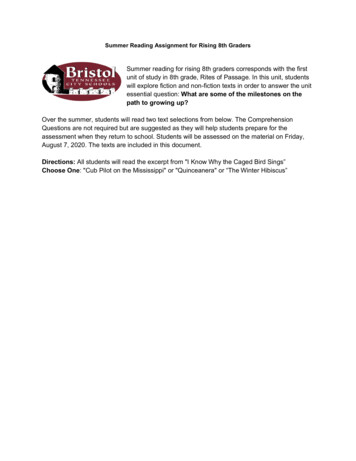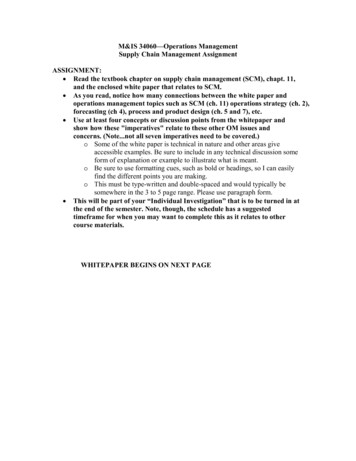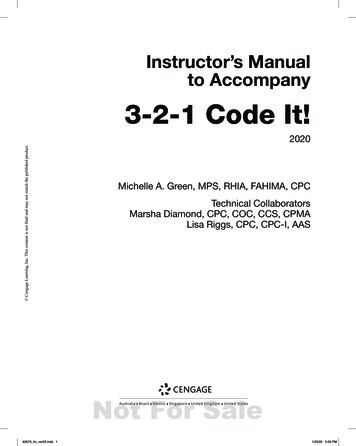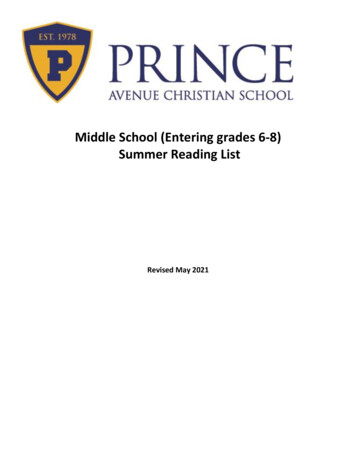
Transcription
Summer Reading Assignment for Rising 8th GradersSummer reading for rising 8th graders corresponds with the firstunit of study in 8th grade, Rites of Passage. In this unit, studentswill explore fiction and non-fiction texts in order to answer the unitessential question: What are some of the milestones on thepath to growing up?Over the summer, students will read two text selections from below. The ComprehensionQuestions are not required but are suggested as they will help students prepare for theassessment when they return to school. Students will be assessed on the material on Friday,August 7, 2020. The texts are included in this document.Directions: All students will read the excerpt from "I Know Why the Caged Bird Sings”Choose One: "Cub Pilot on the Mississippi" or "Quinceanera" or “The Winter Hibiscus”
AUTOBIOGRAPHYfromI Know Why theCaged Bird SingsMaya AngelouAbout the AuthorMaya Angelou (1928–2014) was one of the world’smost celebrated African American authors. BornMarguerite Johnson, Angelou struggled with racism,poverty, and ill treatment early in life. During her longcareer she wore many hats; she was a dancer, actress,singer, teacher, and writer. Angelou was also known forher activism on behalf of women and the AfricanAmerican community.BACKGROUNDCopyright SAVVAS Learning Company LLC. All Rights Reserved.In the early 1930s, when Maya Angelou was three and her brother wasfive, they went to live with their grandmother in Stamps, Arkansas.Angelou lived there until she was 10 years old. This selection is anexcerpt from her well-known autobiography, I Know Why the CagedBird Sings.12We lived with our grandmother and uncle in the rear of theStore (it was always spoken of with a capital s), which shehad owned some twenty-five years.Early in the century, Momma (we soon stopped calling herGrandmother) sold lunches to the sawmen in the lumberyard (eastStamps) and the seedmen at the cotton gin (west Stamps). Hercrisp meat pies and cool lemonade, when joined to her miraculousability to be in two places at the same time, assured her businesssuccess. From being a mobile lunch counter, she set up a standbetween the two points of fiscal interest and supplied the workers’needs for a few years. Then she had the Store built in the heart ofthe Negro area. Over the years it became the lay center of activitiesin town. On Saturdays, barbers sat their customers in the shadeNOTESUNIT 1 Independent Learning from I Know Why the Caged Bird Sings IL10
345678on the porch of the Store, and troubadours1 on their ceaselesscrawlings through the South leaned across its benches and sangtheir sad songs of The Brazos2 while they played juice harps3 andcigar-box guitars.The formal name of the Store was the Wm. Johnson GeneralMerchandise Store. Customers could find food staples, a goodvariety of colored thread, mash for hogs, corn for chickens, coal oilfor lamps, light bulbs for the wealthy, shoestrings, hair dressing,balloons, and flower seeds. Anything not visible had only to beordered.Until we became familiar enough to belong to the Store andit to us, we were locked up in a Fun House of Things where theattendant had gone home for life. Weighing the half-pounds of flour, excluding the scoop, anddepositing them dust-free into the thin paper sacks held a simplekind of adventure for me. I developed an eye for measuringhow full a silver-looking ladle of flour, mash, meal, sugar orcorn had to be to push the scale indicator over to eight ouncesor one pound. When I was absolutely accurate our appreciativecustomers used to admire: “Sister Henderson sure got some smartgrandchildrens.” If I was off in the Store’s favor, the eagle-eyedwomen would say, “Put some more in that sack, child. Don’t youtry to make your profit offa me.”Then I would quietly but persistently punish myself. For everybad judgment, the fine was no silver-wrapped kisses, the sweetchocolate drops that I loved more than anything in the world,except Bailey. And maybe canned pineapples. My obsession withpineapples nearly drove me mad. I dreamt of the days when Iwould be grown and able to buy a whole carton for myself alone.Although the syrupy golden rings sat in their exotic cans onour shelves year round, we only tasted them during Christmas.Momma used the juice to make almost-black fruit cakes. Then shelined heavy soot-encrusted iron skillets with the pineapple ringsfor rich upside-down cakes. Bailey and I received one slice each,and I carried mine around for hours, shredding off the fruit untilnothing was left except the perfume on my fingers. I’d like tothink that my desire for pineapples was so sacred that I wouldn’tallow myself to steal a can (which was possible) and eat it aloneout in the garden, but I’m certain that I must have weighed thepossibility of the scent exposing me and didn’t have the nerve toattempt it.Until I was thirteen and left Arkansas for good, the Store wasmy favorite place to be. Alone and empty in the mornings, it1. troubadours (TROO buh dawrz) n. traveling musicians.2. The Brazos (BRAHZ uhs) area in Central Texas near the Brazos River.3. juice harps small musical instruments held between the teeth and played by pluckinga metal band.IL11 UNIT 1 Independent Learning from I Know Why the Caged Bird SingsCopyright SAVVAS Learning Company LLC. All Rights Reserved.NOTES
looked like an unopened present from a stranger. Opening thefront doors was pulling the ribbon off the unexpected gift. Thelight would come in softly (we faced north), easing itself over theshelves of mackerel, salmon, tobacco, thread. It fell flat on thebig vat of lard and by noontime during the summer the greasehad softened to a thick soup. Whenever I walked into the Storein the afternoon, I sensed that it was tired. I alone could hearthe slow pulse of its job half done. But just before bedtime, afternumerous people had walked in and out, had argued over theirbills, or joked about their neighbors, or just dropped in “to giveSister Henderson a ‘Hi y’all,’” the promise of magic morningsreturned to the Store and spread itself over the family in washedlife waves . . . .91011Copyright SAVVAS Learning Company LLC. All Rights Reserved.12131415NOTESWhen Maya was about ten years old, she returned to Stamps froma visit to St. Louis with her mother. She had become depressed andwithdrawn.For nearly a year, I sopped around the house, the Store, theschool and the church, like an old biscuit, dirty and inedible.Then I met, or rather got to know, the lady who threw me my firstlifeline.Mrs. Bertha Flowers was the aristocrat4 of Black Stamps. Shehad the grace of control to appear warm in the coldest weather,and on the Arkansas summer days it seemed she had a privatebreeze which swirled around, cooling her. She was thin withoutthe taut look of wiry people, and her printed voile5 dresses andflowered hats were as right for her as denim overalls for a farmer.She was our side’s answer to the richest white woman in town.Her skin was a rich black that would have peeled like a plumif snagged, but then no one would have thought of getting closeenough to Mrs. Flowers to ruffle her dress, let alone snag her skin.She didn’t encourage familiarity. She wore gloves too.I don’t think I ever saw Mrs. Flowers laugh, but she smiledoften. A slow widening of her thin black lips to show even, smallwhite teeth, then the slow effortless closing. When she chose tosmile on me, I always wanted to thank her. The action was sograceful and inclusively benign.She was one of the few gentlewomen I have ever known, andhas remained throughout my life the measure of what a humanbeing can be. . . . .One summer afternoon, sweet-milk fresh in my memory, shestopped at the Store to buy provisions. Another Negro woman ofher health and age would have been expected to carry the paper4. aristocrat (uh RIHS tuh krat) n. person belonging to the upper class.5. voile (voyl) n. light cotton fabric.UNIT 1 Independent Learning from I Know Why the Caged Bird Sings IL12
16171819202122232425sacks home in one hand, but Momma said, “Sister Flowers, I’llsend Bailey up to your house with these things.” She smiled thatslow dragging smile, “Thank you, Mrs. Henderson. I’d preferMarguerite, though.” My name was beautiful when she said it.“I’ve been meaning to talk to her, anyway.” They gave each otherage-group looks.Momma said, “Well, that’s all right then. Sister, go and changeyour dress. You going to Sister Flowers’s . . .”There was a little path beside the rocky road, and Mrs. Flowerswalked in front swinging her arms and picking her way over thestones.She said, without turning her head, to me, “I hear you’re doingvery good school work, Marguerite, but that it’s all written. Theteachers report that they have trouble getting you to talk in class.”We passed the triangular farm on our left and the path widenedto allow us to walk together. I hung back in the separate unaskedand unanswerable questions.“Come and walk along with me, Marguerite.” I couldn’t haverefused even if I wanted to. She pronounced my name so nicely.Or more correctly, she spoke each word with such clarity that Iwas certain a foreigner who didn’t understand English could haveunderstood her.“Now no one is going to make you talk—possibly no one can.But bear in mind, language is man’s way of communicating withhis fellow man and it is language alone which separates himfrom the lower animals.” That was a totally new idea to me, and Iwould need time to think about it.“Your grandmother says you read a lot. Every chance you get.That’s good, but not good enough. Words mean more than what isset down on paper. It takes the human voice to infuse them withthe shades of deeper meaning.”I memorized the part about the human voice infusing words. Itseemed so valid and poetic.She said she was going to give me some books and that I notonly must read them, I must read them aloud. She suggestedthat I try to make a sentence sound in as many different ways aspossible.“I’ll accept no excuse if you return a book to me that has beenbadly handled.” My imagination boggled at the punishment Iwould deserve if in fact I did abuse a book of Mrs. Flowers’. Deathwould be too kind and brief.The odors in the house surprised me. Somehow I had neverconnected Mrs. Flowers with food or eating or any other commonexperience of common people. There must have been an outhouse,too, but my mind never recorded it.IL13 UNIT 1 Independent Learning from I Know Why the Caged Bird SingsCopyright SAVVAS Learning Company LLC. All Rights Reserved.NOTES
262728293031Copyright SAVVAS Learning Company LLC. All Rights Reserved.323334The sweet scent of vanilla had met us as she opened the door.“I made tea cookies this morning. You see, I had planned toinvite you for cookies and lemonade so we could have this littlechat. The lemonade is in the icebox.”It followed that Mrs. Flowers would have ice on an ordinaryday, when most families in our town bought ice late on Saturdaysonly a few times during the summer to be used in the wooden icecream freezers.She took the bags from me and disappeared through the kitchendoor. I looked around the room that I had never in my wildestfantasies imagined I would see. Browned photographs leered orthreatened from the walls and the white, freshly done curtainspushed against themselves and against the wind. I wanted togobble up the room entire and take it to Bailey, who would helpme analyze and enjoy it.“Have a seat, Marguerite. Over there by the table.” She carrieda platter covered with a tea towel. Although she warned that shehadn’t tried her hand at baking sweets for some time, I was certainthat like everything else about her the cookies would be perfect.They were flat round wafers, slightly browned on the edgesand butter-yellow in the center. With the cold lemonade they weresufficient for childhood’s lifelong diet. Remembering my manners,I took nice little ladylike bites off the edges. She said she had madethem expressly for me and that she had a few in the kitchen thatI could take home to my brother. So I jammed one whole cake inmy mouth and the rough crumbs scratched the insides of my jaws,and if I hadn’t had to swallow, it would have been a dreamcome true.As I ate she began the first of what we later called “my lessonsin living.” She said that I must always be intolerant of ignorancebut understanding of illiteracy. That some people, unable to goto school, were more educated and even more intelligent thancollege professors. She encouraged me to listen carefully to whatcountry people called mother wit. That in those homely sayingswas couched the collective wisdom of generations.When I finished the cookies she brushed off the table andbrought a thick, small book from the bookcase. I had read A Taleof Two Cities and found it up to my standards as a romantic novel.She opened the first page and I heard poetry for the first time inmy life.“It was the best of times and the worst of times . . . ” Her voiceslid in and curved down through and over the words. She wasnearly singing. I wanted to look at the pages. Were they the samethat I had read? Or were there notes, music, lined on the pages, asin a hymn book? Her sounds began cascading gently. I knew fromNOTESUNIT 1 Independent Learning from I Know Why the Caged Bird Sings IL14
3536373839404142listening to a thousand preachers that she was nearing the endof her reading, and I hadn’t really heard, heard to understand, asingle word.“How do you like that?”It occurred to me that she expected a response. The sweetvanilla flavor was still on my tongue and her reading was awonder in my ears. I had to speak.I said, “Yes, ma’am.” It was the least I could do, but it was themost also.“There’s one more thing. Take this book of poems andmemorize one for me. Next time you pay me a visit, I want you torecite.”I have tried often to search behind the sophistication of yearsfor the enchantment I so easily found in those gifts. The essenceescapes but its aura6 remains. To be allowed, no, invited, into theprivate lives of strangers, and to share their joys and fears, wasa chance to exchange the Southern bitter wormwood7 for a cupof mead with Beowulf8 or a hot cup of tea and milk with OliverTwist. When I said aloud, “It is a far, far better thing that I do,than I have ever done9 . . . ” tears of love filled my eyes at myselflessness.On that first day, I ran down the hill and into the road (few carsever came along it) and had the good sense to stop running beforeI reached the Store.I was liked, and what a difference it made. I was respected notas Mrs. Henderson’s grandchild or Bailey’s sister but for just beingMarguerite Johnson.Childhood’s logic never asks to be proved (all conclusions areabsolute). I didn’t question why Mrs. Flowers had singled meout for attention, nor did it occur to me that Momma might haveasked her to give me a little talking to. All I cared about was thatshe had made tea cookies for me and read to me from her favoritebook. It was enough to prove that she liked me. 6. aura (AWR uh) n. atmosphere or quality.7. wormwood n. plant that produces a bitter oil.8. Beowulf (BAY uh wulf) hero from an ancient Anglo-Saxon epic poem. People in thispoem drink mead, a drink made with honey and water.9. “It is . . . than I have ever done” last two lines from A Tale of Two Cities by CharlesDickens, uttered by Sydney Carton as he sacrifices his own life to save Charles Darnay, theman whom Lucie Manette—Carton’s beloved—truly loves.IL15 UNIT 1 Independent Learning from I Know Why the Caged Bird SingsCopyright SAVVAS Learning Company LLC. All Rights Reserved.NOTES
Name:Date:I Know Why the Caged Bird SingsMaya AngelouDIRECTIONS:Complete the following items after you finish your first read.1.Who owns the Store?2.What does Marguerite do at the Store?3.Whose house does Marguerite visit?4.What is Marguerite tasked with doing when she receives a book of poems?5.To confirm your understanding, write a summary of the excerpt fromI Know Why the Caged Bird Sings. by Savvas Learning Company LLC. All Rights Reserved.1
I Know Why the Caged Bird SingsMaya AngelouDIRECTIONS:Respond to these questions using textual evidence.(a) What does Marguerite mean when she observes that Mrs. Flowersseemed to have a “private breeze” on hot days? (b) Analyze What does thisdescription reveal about Marguerite’s view of Mrs. Flowers?1. Interpret2. Draw Conclusions Why mightinfluence?3. Compare How does4.Marguerite be particularly open to Mrs. Flowers’sMrs. Flowers compare to the other people in Stamps?(a) Analyze What effect does the afternoon with Mrs. Flowers have on Marguerite?(b) Infer Why do you think that Mrs. Flowers takes an interest in her?What are some milestones on the path to growing up? Whathave you learned about childhood by reading this selection?5. Essential Question: by Savvas Learning Company LLC. All Rights Reserved.2
MEMOIRCub Pilot onthe MississippiMark TwainAbout the AuthorSamuel Langhorne Clemens (1835–1910) was anAmerican author and humorist. Clemens grew up alongthe Mississippi River in Missouri and became a riverboatpilot at the age of twenty-three. Later, when Clemensbecame an author, he adopted the pen name MarkTwain, a boating term meaning “two fathoms (twelvefeet) deep.” Mark Twain is best known for his novels,The Adventures of Tom Sawyer and The Adventures of Huckleberry Finn.The invention of the steam engine in the 1600s laid the groundwork forthe Industrial Revolution and was later used as the basis for other typesof engines. In the 1880s, steamboats carried goods and people on thewide, long Mississippi River. In his memoir, Mark Twain tells the story ofhis days as a cub pilot, or young trainee, learning to pilot a Mississippisteamboat.NOTES12During the two or two and a half years of my apprenticeship1I served under many pilots, and had experience of manykinds of steamboatmen and many varieties of steamboats. I am tothis day profiting somewhat by that experience; for in that brief,sharp schooling, l got personally and familiarly acquainted withabout all the different types of human nature that are to be foundin fiction, biography, or history.The fact is daily borne in upon me that the average shoreemployment requires as much as forty years to equip a man withthis sort of an education. When I say I am still profiting by thisthing I do not mean that it has constituted me a judge of men—no,1. apprenticeship (uh PREHN tihs shihp) n. time spent working for a master craftsperson inreturn for instruction in his or her craft.IL1 UNIT 1 Independent Learning Cub Pilot on the MississippiCopyright SAVVAS Learning Company LLC. All Rights Reserved.BACKGROUND
34Copyright SAVVAS Learning Company LLC. All Rights Reserved.567891011it has not done that, for judges of men are born, not made. Myprofit is various in kind and degree, but the feature of it whichI value most is the zest which that early experience has given tomy later reading. When I find a well-drawn character in fiction orbiography I generally take a warm personal interest in him, for thereason that I have known him before—met him on the river.The figure that comes before me oftenest, out of the shadows ofthat vanished time, is that of Brown, of the steamer Pennsylvania.He was a middle-aged, long, slim, bony, smooth-shaven,horsefaced, ignorant, stingy, malicious, snarling, fault-hunting,mote magnifying tyrant.2 I early got the habit of coming on watchwith dread at my heart. No matter how good a time I might havebeen having with the off-watch below, and no matter how highmy spirits might be when I started aloft, my soul became lead inmy body the moment I approached the pilothouse.I still remember the first time I ever entered the presenceof that man. The boat had backed out from St. Louis and was“straightening down.” I ascended to the pilothouse in highfeather, and very proud to be semiofficially a member of theexecutive family of so fast and famous a boat. Brown was at thewheel, I paused in the middle of the room, all fixed to make mybow, but Brown did not look around. I thought he took a furtiveglance at me out of the corner of his eye, but as not even thisnotice was repeated, I judged I had been mistaken. By this time hewas picking his way among some dangerous “breaks” abreast thewoodyards; therefore it would not be proper to interrupt him; so Istepped softly to the high bench and took a seat.There was silence for ten minutes; then my new boss turnedand inspected me deliberately and painstakingly from head toheel for about—as it seemed to me—a quarter of an hour. Afterwhich he removed his countenance3 and I saw it no more for someseconds: then it came around once more, and this question greetedme: “Are you Horace Bigsby’s cub?”“Yes, sir.”After this there was a pause and another inspection. Then:“What’s your name?”I told him. He repeated it after me. It was probably the onlything he ever forgot; for although I was with him many months henever addressed himself to me in any other way than “Here!” andthen his command followed.“Where was you born?”“In Florida, Missouri.”A pause. Then: “Dern sight better stayed there!”NOTES2. mote magnifying tyrant cruel authority figure who exaggerates every tiny fault.3. countenance (KOWN tuh nuhns) n. face.UNIT 1 Independent Learning Cub Pilot on the Mississippi IL2
13141516171819202122232425262728By means of a dozen or so of pretty direct questions, hepumped my family history out of me.The leads4 were going now in the first crossing. This interruptedthe inquest. When the leads had been laid in he resumed:“How long you been on the river?”I told him. After a pause:“Where’d you get them shoes?”I gave him the information.“Hold up your foot!”I did so. He stepped back, examined the shoe minutely andcontemptuously, scratching his head thoughtfully, tilting hishigh sugarloaf hat well forward to facilitate the operation, thenejaculated, “Well. I’ll be dod derned!” and returned to his wheel.What occasion there was to be dod derned about it is a thingwhich is still as much of a mystery to me now as it was then. Itmust have been all of fifteen minutes—fifteen minutes of dullhomesick silence—before that long horse-face swung round uponme again—and then what a change! It was as red as fire, andevery muscle in it was working. Now came this shriek: “Here! Yougoing to set there all day?”I lit in the middle of the floor, shot there by the electricsuddenness of the surprise. As soon as I could get my voice I saidapologetically: “I have had no orders, sir.”“You’ve had no orders! My, what a fine bird we are! We musthave orders! Our father was a gentleman—and we’ve been to school.Yes, we are a gentleman, too, and got to have orders! Orders, is it?Orders is what you want! Dod dern my skin, I’ll learn you to swellyourself up and blow around here about your dod-derned orders.G’way from the wheel!” (I had approached it without knowing it.)I moved back a step or two and stood as in a dream, all mysenses stupefied by this frantic assault.“What you standing there for? Take that ice-pitcher down to thetexas-tender!5 Come, move along, and don’t you be all day aboutit!”The moment I got back to the pilothouse Brown said: “Here!What was you doing down there all this time?”“I couldn’t find the texas-tender; I had to go all the way to thepantry.”“Derned likely story! Fill up the stove.”I proceeded to do so. He watched me like a cat. Presently heshouted: “Put down that shovel! Derndest numskull I ever saw—ain’t even got sense enough to load up a stove.”4. leads (lehdz) n. weights that are lowered to test the depth of the river.5. texas-tender waiter in the officers’ quarters. On Mississippi steamboats, rooms werenamed after the states. The officers’ area, being the largest, was named after Texas,then the largest state.IL3 UNIT 1 Independent Learning Cub Pilot on the MississippiCopyright SAVVAS Learning Company LLC. All Rights Reserved.12NOTES
29303132333435Copyright SAVVAS Learning Company LLC. All Rights Reserved.363738All through the watch this sort of thing went on. Yes, and thesubsequent watches were much like it during a stretch of months.As I have said, I soon got the habit of coming on duty withdread. The moment I was in the presence, even in the darkestnight, I could feel those yellow eyes upon me, and knew theirowner was watching for a pretext to spit out some venom on me.Preliminarily he would say: “Here! Take the wheel.”Two minutes later: “Where in the nation you going to? Pull herdown! pull her down!”After another moment: “Say! You going to hold her all day? Lether go—meet her! meet her!”Then he would jump from the bench, snatch the wheel from me,and meet her himself, pouring out wrath upon me all the time.George Ritchie was the other pilot’s cub. He was having goodtimes now; for his boss, George Ealer, was as kindhearted asBrown wasn’t. Ritchie had steered for Brown the season before;consequently, he knew exactly how to entertain himself andplague me, all by the one operation.Whenever I took the wheel for a moment on Ealer’s watch,Ritchie would sit back on the bench and play Brown, withcontinual ejaculations of “Snatch her! Snatch her! Derndestmudcat I ever saw!” “Here! Where are you going now? Going torun over that snag?” “Pull her down! Don’t you hear me? Pull herdown!” “There she goes! Just as I expected! I told you not to crampthat reef. G’way from the wheel!”So I always had a tough time of it no matter whose watch itwas; and sometimes it seemed to me that Ritchie’s good-naturedbadgering was pretty nearly as aggravating as Brown’s deadearnest nagging.I often wanted to kill Brown, but this would not answer. Acub had to take everything his boss gave, in the way of vigorouscomment and criticism; and we all believed that there was aUnited States law making it a penitentiary offense to strike orthreaten a pilot who was on duty.However, I could imagine myself killing Brown; there was nolaw against that; and that was the thing I used always to do themoment I was abed. Instead of going over my river in my mind,as was my duty, I threw business aside for pleasure, and killedBrown. I killed Brown every night for months; not in old, stale,commonplace ways, but in new and picturesque ones—ways thatwere sometimes surprising for freshness of design and ghastlinessof situation and environment.Brown was always watching for a pretext to find fault; andif he could find no plausible pretext, he would invent one. Hewould scold you for shaving a shore, and for not shaving it; forhugging a bar, and for not hugging it; for “pulling down” whenNOTESUNIT 1 Independent Learning Cub Pilot on the Mississippi IL4
3940414243not invited, and for not pulling down when not invited; for firingup without orders, and for waiting for orders. In a word, it was hisinvariable rule to find fault with everything you did and anotherinvariable rule of his was to throw all his remarks (to you) into theform of an insult.One day we were approaching New Madrid, bound down andheavily laden. Brown was at one side of the wheel, steering; I wasat the other, standing by to “pull down” or “shove up.” He cast afurtive glance at me every now and then. I had long ago learnedwhat that meant; viz., he was trying to invent a trap for me. Iwondered what shape it was going to take. By and by he steppedback from the wheel and said in his usual snarly way:“Here! See if you’ve got gumption enough to round her to.”This was simply bound to be a success; nothing could preventit; for he had never allowed me to round the boat to before;consequently, no matter how I might do the thing, he could findfree fault with it. He stood back there with his greedy eye on me,and the result was what might have been foreseen; I lost my headin a quarter of a minute, and didn’t know what I was about; Istarted too early to bring the boat around, but detected a greengleam of joy in Brown’s eye, and corrected my mistake. I startedround once more while too high up, but corrected myself again intime. I made other false moves, and still managed to save myself;but at last I grew so confused and anxious that I tumbled into thevery worst blunder of all—I got too far down before beginning tofetch the boat around. Brown’s chance was come.His face turned red with passion; he made one bound, hurledme across the house with a sweep of his arm, spun the wheeldown, and began to pour out a stream of vituperation6 upon mewhich lasted till he was out of breath. In the course of this speechhe called me all the different kinds of hard names he could thinkof, and once or twice I thought he was even going to swear—buthe had never done that, and he didn’t this time. “Dod dern” wasthe nearest he ventured to the luxury of swearing.Two trips later I got into serious trouble. Brown was steering; Iwas “pulling down.” My younger brother Henry appeared on thehurricane deck, and shouted to Brown to stop at some landing orother, a mile or so below. Brown gave no intimation7 that he hadheard anything. But that was his way; he never condescended totake notice of an underclerk. The wind was blowing; Brown wasdeaf (although he always pretended he wasn’t), and I very muchdoubted if he had heard the order. If I had had two heads, I wouldhave spoken; but as I had only one, it seemed judicious to takecare of it; so I kept still.6. vituperation (vy too puh RAY shuhn) n. abusive language.7. intimation (ihn tuh MAY shuhn) n. hint or suggestion.IL5 UNIT 1 Independent Learning Cub Pilot on the MississippiCopyright SAVVAS Learning Company LLC. All Rights Reserved.NOTES
444546Copyright SAVVAS Learning Company LLC. All Rights Reserved.474849505152Presently, sure enough, we went sailing by that plantation.Captain Klinefelter appeared on the deck, and said: “Let her comearound, sir, let her come around. Didn’t Henry tell you to landhere?”“No, sir!”“I sent him up to do it.”“He did come up; and that’s all the good it done, the dodderned fool. He never said anything.”“Didn’t you hear him?
Summer reading for rising 8th graders corresponds with the first unit of study in 8th grade, Rites of Passage. In this unit, students will explore fiction and non-fiction texts in order to answer the unit essential question: What are some of the milestones on the path to growing up? Over th










